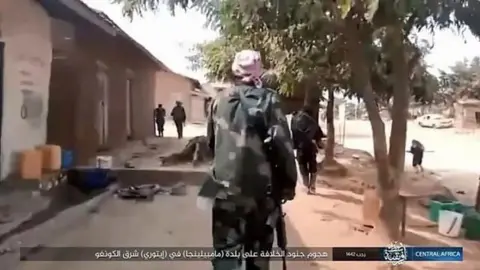On July 27, 2025, an alarming attack occurred in the northeastern region of the Democratic Republic of Congo, where numerous churchgoers fell victim to violence linked to the Islamic State group. Official reports indicate that around twenty worshippers were murdered during a nighttime vigil at a church located in the town of Komanda. The assault was attributed to fighters from the Allied Democratic Forces (ADF), a group with roots tracing back to Uganda in the 1990s, initially formed under claims of Muslim persecution by the Ugandan government. However, the ADF has since moved its operational base to the Congo, where it indiscriminately targets civilians, regardless of their faith.
Witnesses claimed that the violence extended beyond just killings, as nearby shops and businesses were looted and subsequently set ablaze. Following the attack, connected bodies and burnt structures were found in the area, indicating the scope of the brutality inflicted upon the local populace. Dieudonne Duranthabo, a civil society leader in Komanda, informed the press that more victims may still be discovered, emphasizing that “more than 21 people were shot dead inside and outside [the church]” with additional reports confirming “at least three charred bodies and several houses burned.”
The local priest, Father Aime Lokana Dhego, offered a harrowing account that highlighted the depth of the tragedy, reporting a total of thirty-one fatalities among members of the Eucharistic Crusade movement and noting that several others were seriously injured or kidnapped. The United Nations-sponsored Radio Okapi presented an even grimmer tally, stating that the total number of deceased had reached as high as forty-three, while military officials released a conservative estimate of ten.
The ADF’s association with the Islamic State’s Central African Province has become more pronounced over the years, and research indicates that nearly 90% of Islamic State operations are currently conducted by its African affiliates. For years now, the Ituri province, where Komanda is situated, has become a hotspot for various armed groups vying for control over the mineral-rich region, leading to continuous assaults on civilian life and increased instability.
In the face of growing violence from the ADF and other militant factions, the government of the Democratic Republic of Congo extended invitations for assistance to foreign troops, including Ugandan soldiers, to help quell the ongoing threats. Unfortunately, such measures have not yet yielded the desired safety for Congolese communities. As a poignant reminder, this incident serves as part of a broader trend of escalating violence affecting various regions in Africa.
The overall situation surrounding the ADF serves as a stark illustration of how regional tensions can evolve and attract global attention. The intertwining of local grievances with established militant networks signifies a dangerous shift that has captured the attention of international observers and regional leaders alike. As these factions gain strength and influence, the citizens of regions like eastern Congo are left in a precarious state, calling upon both local and international authorities to address the mounting crisis.
In light of the increasing impacts of such violence, many are left wondering what measures will be implemented in the wake of this tragedy and whether any significant steps can be taken to safeguard vulnerable communities. The violence in Komanda offers a stark endorsement of the pressing need for significant action and remediation to restore stability to the troubled regions of the Democratic Republic of Congo and beyond.












